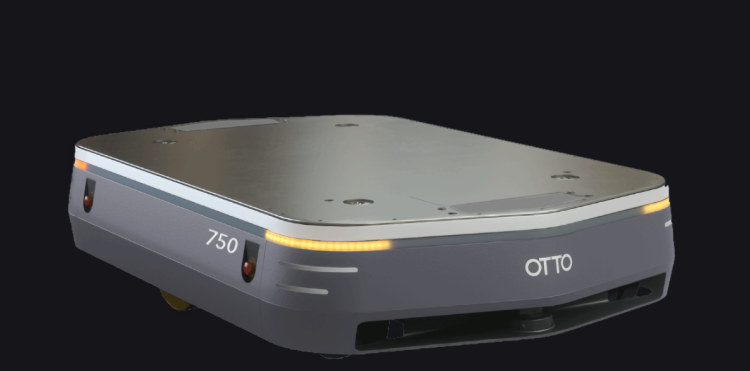If lugging 750-kilogram payloads around warehouse floors isn’t your idea of fun, good news: There’s a new robot that’ll do it for you. Clearpath Robotics — a company founded in 2009 by four University of Waterloo graduates who initially sought to develop a robot that could detect and remove land mines — today announced the Otto 750, a vehicle designed to autonomously transport pallets, racks, and other medium-sized payloads through obstacle-strewn environments.
It joins the Otto 100 (which is designed to carry 100-kilogram loads) and the Otto 1500 (which carries up to 1,500 kilograms) in Clearpath’s product lineup. “We realized [the Otto 750] was a Goldilocks solution,” Clearpath CEO Matt Rendall said in a statement. “Our customers have been asking for something just right for quite a while, and now we finally have it.”
The steel-welded Otto 750 measures 1,190 by 1,810 by 400 millimeters in size and boasts an array of sensors (including a lidar sensor) that enables it to map its surroundings and track reference points without the need for guides, infrastructure, or predefined paths. Brake lights, turn signals, and audible tones communicate its intent, and its fixed mounting points can accommodate cargo from pallets and bins to cages. And when it comes time to load or unload a payload, the Otto 750 can use a standard powered roller or lift attachment to interface with a conveyor system or stand.
The bulk of Otto 750’s routines are orchestrated through Otto Fleet Manager, Clearpath’s cross-platform control solution, and managed with its proprietary Otto OS software. Additionally, the robot communicates with existing systems including PLCs, SCADA systems, and Manufacturing Execution Systems (MES).
June 5th: The AI Audit in NYC
Join us next week in NYC to engage with top executive leaders, delving into strategies for auditing AI models to ensure fairness, optimal performance, and ethical compliance across diverse organizations. Secure your attendance for this exclusive invite-only event.
Clearpath — which counts General Motors, John Deere, and other household names among its customers — competes in the $3.1 billion intelligent machines market with Los Angeles-based robotics startup InVia, which leases automated robotics technologies to fulfillment centers; Gideon Brothers, a Croatia-based industrial startup led by TransferWise cofounder Taavet Hinrikus; and robotics systems company GreyOrange, among others. Fulfillment alone is a $9 billion industry — roughly 60,000 employees handle orders in the U.S., and companies like Apple manufacturing partner Foxconn have deployed tens of thousands of assistive robots in assembly plants overseas.
“The market for self-driving passenger vehicles will be over $80 billion by 2030,” Rendall said, citing a report from Lux Research. “We believe the market for self-driving materials handling vehicles will be equally significant.”
Clearpath’s most recent venture capital round in 2016 totaled $30 million and brought its total raised to $41.6 million. Its investors include iNovia Capital, Caterpillar Ventures, GE Ventures, Eclipse Ventures, RRE Ventures, and Silicon Valley Bank.

